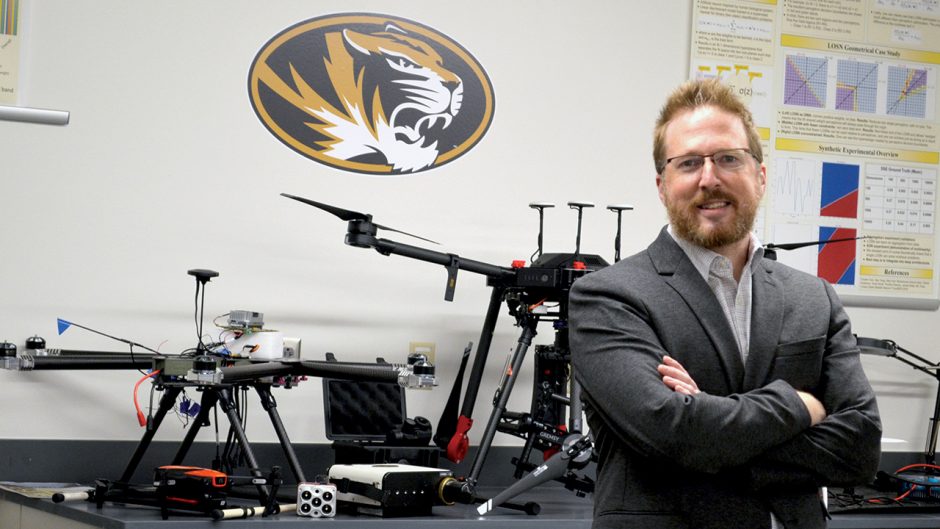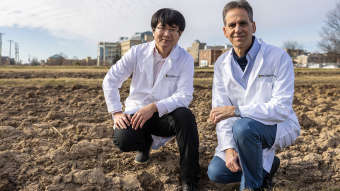
April 5, 2023
Contact: Marcus Wilkins, wilkinsm@missouri.edu
Long before pursuing advanced degrees at the University of Missouri, Derek Anderson peered across the plains of eastern Kansas as an undergraduate hoping to glimpse the future. The year was 1998, and a computer science professor at Wichita State University introduced Anderson to the nascent field of artificial intelligence (AI).
Today, after 20-plus years in the industry, it’s an understatement to say the concept piqued his interest. But back then his enthusiasm collided with pragmatism.
“My professor told me I couldn’t actually do AI as a career because it wasn’t well funded, and I should pursue something peripheral like database indexing and retrieval,” said Anderson, now an associate professor in electrical engineering and computer science in the College of Engineering. “So, I set out to make my own way, starting with a master’s and PhD at Mizzou.”
New frontiers
These days, AI is at the forefront of everyone’s mind, and Anderson is at the forefront of AI. His acumen includes a list of specialties elemental to the field: information fusion, machine learning, computational intelligence and computer vision, to name a few. His most recent research projects include training AI to better detect landmines by using simulated environments, and “explainable AI” — a concept aimed at engineering AI capable of explaining its own decision-making processes.
And he’s not doing it alone. Anderson’s students (undergraduate through doctoral) are gaining experience in his lab and going on to land big-time jobs in the AI sector. Even freshmen are taking advantage of Anderson’s hands-on research opportunities and supercharging their academic trajectories.
“I always knew I was going to major in computer science, but the opportunity to immediately do research in an actual lab is what sold me on Mizzou,” said Dhruv Agarwal, a freshman Discovery Fellow from St. Louis. “In Dr. Anderson’s lab, I’m working on a project to help make synthetic data more applicable for machine learning — such as teaching a smart car to recognize roadblocks or traffic lights by learning from synthetic images. It’s exciting to get your foot in the door so early.”
All the rage
While headline-grabbing AI systems such as Chat GPT and DALL-E have captured our collective imagination by creating eloquent prose and stunning graphic art, Anderson sees them as only the latest phase of AI’s multi-decade lifespan that has included peaks and valleys.
“I’m part of what could be considered the third generation of AI scientists,” Anderson said. “In the ’50s, it was mostly armchair thinking and philosophy. Then there was a second wave in the ’80s when we incorporated a lot of rule-based systems and expert systems, but they became brittle and couldn’t do everything. I came to AI during the third generation, and pattern recognition — now called machine learning — is basically the migrating of statistics and mathematics over to AI.”
Anderson’s work in explainable AI seeks to revolutionize diagnostic and decision-making processes in AI systems. In most cases, an AI system is tasked with arriving at an output — such as DALL-E creating a picture based on a text prompt. Explainable AI works to build in explanations of why the system arrived at the output, exposing potential biases or incongruencies in uncertain conditions — a critical step in implementing future AI policy.
It’s a complex problem that could very well revolutionize how AI systems are built, and Anderson’s students are on the ground floor of yet another potential wave.
“I plan on going into an accelerated master’s program through Dr. Anderson’s lab because I find this research so fascinating and exciting,” said Phillip Lei, a freshman computer science major from Columbia. “And after graduation, I hope to continue doing research.”
Anderson’s guidance is sought beyond Mizzou’s halls, too. He is program co-chair for three national AI conferences in 2023, a role that includes coordinating the events’ programming and logistics. He also sits on multiple Institute of Electrical and Electronics Engineers committees.
Yet, as globally impactful and philosophically weighty as the topic of AI is, Anderson relishes the opportunity to mold minds — including his own. For him, it’s the “why” that explains his motivation.
“I’m pretty sure I learn as much from my students as they do from me,” Anderson said. “If they don’t quite understand a concept and I need to explain it differently, it helps me to better understand my concepts, or to look at things from another perspective. The classroom and lab are great intellectual places where I’m changing myself and hopefully changing them.
“It’s why I’m at Mizzou.”



